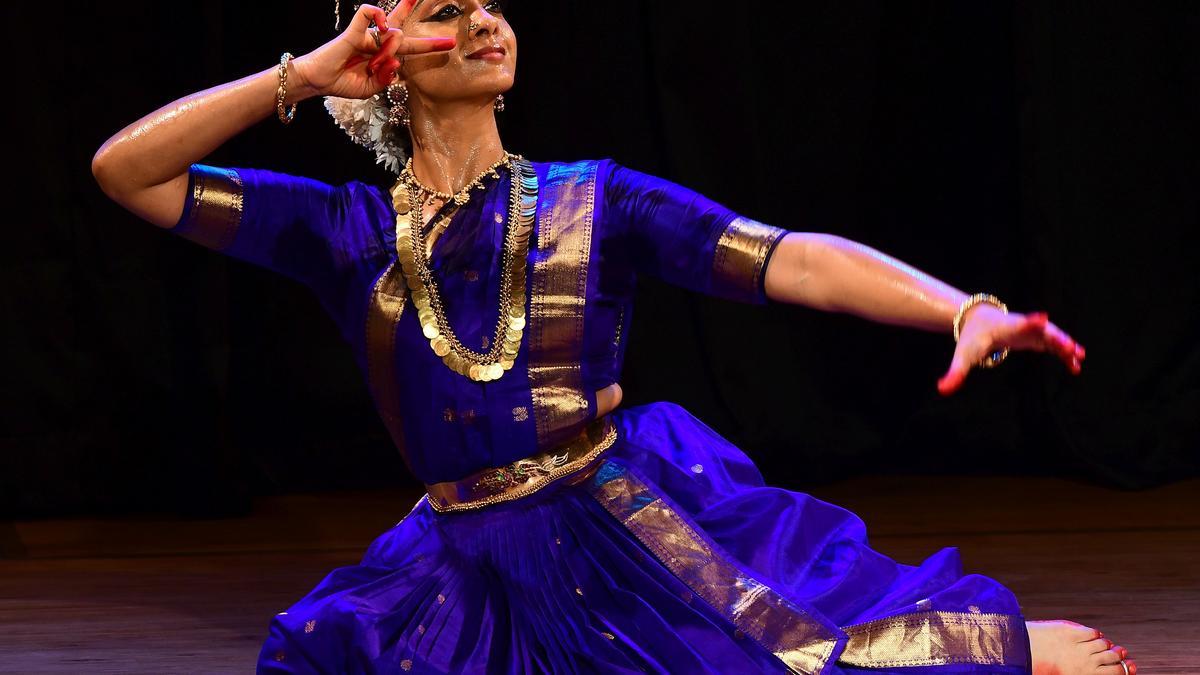
In an intriguing deviation from the conventional, Aryamba Sriram commenced her Bharatanatyam recital for The Music Academy HCL concerts with the soul-stirring ‘Amba Neelambari’. Traditionally, performances in this classical art form start with an alarippu followed by a mallari, but Aryamba’s choice showcased the ideal amalgamation of progressive thinking within the constraints of purist traditions. The evening opened with an enchanting composition by Ponniah Pillai, set in the tranquil raga Nilambari, dedicated to the divine goddess. This piece, skillfully choreographed by the distinguished Leela Samson, deftly set the tone for an unforgettable evening of dance and music.
The sancharis in the performance beautifully described the resplendent form of the goddess, Amba. With eyes resembling lotuses and a gaze brimming with benevolence capable of dissipating any negativity, Aryamba’s portrayal was a carefully orchestrated mix of understated elegance and theatrical expression. The gentle tempo of the singing elevated the melodic appeal, enabling Aryamba’s adavus to shine with pristine precision and grace.
The high point of the evening was undoubtedly the ragamalika varnam, a depiction of the Khandita nayika deeply enamored with the deity Shiva, imploring her confidante to bring her beloved to her. Composed by Dhandayuthapani Pillai, this varnam remains a favorite among dancers for its vast potential to showcase nuanced abhinaya, the expressive element of dance. Aryamba’s rendition was an exemplar of sophistication, seamlessly interweaving nritta and abhinaya to captivate the audience with her mastery.
Following this tour de force were two compositions, stylistically and emotionally contrasting, yet equally enthralling. The Kshetrayya padam ‘Emani Telupudu’ in the evocative raga Anandabhairavi, explored the unfolding heartache and longing of a nayika separated from her beloved Venugopala. Through the subtlest of expressions and deliberate emotional layering, Aryamba skillfully conjured a complex tapestry of sentiments that resonated with her audience. The sorrowful ruminations of a nayika agonizing over her man’s betrayal came vividly alive in the performance of the Saveri raga javali, ‘Mutta Vadhura’, composed by Chinniah. Each movement and posture exuded the anguish and conflicting emotions of the spurned lover, revealing Aryamba’s depth of interpretive ability.
. The choreography for these two pieces was the creative handiwork of Bragha Bessel.
The culmination of the evening was marked by a lively Surutti thillana, a composition of the celebrated Oothukadu Venkatakavi, brought to life through the choreography of K. P. Rakesh. This vibrant finale provided a fitting contrast, leaving the audience energized and invigorated.
The success of the performance was supported by the melodious singing of Srikanth Gopalakrishnan. His voice was complemented by the rhythmic precision of Kiran Pai on the mridangam, the emotive strains of K.P. Nandini’s violin, the lyrical notes of Muthukumar’s flute, and K. P. Rakesh’s authoritative nattuvangam. Each musician’s contribution enhanced the holistic experience of the performance, adding nuanced layers to Aryamba’s captivating depiction.
Aryamba Sriram’s decision to prioritize saukhyam, or artistic tranquility, over sheer velocity in her dance allowed the rich textures of the music and the intricate layers of expression to come through powerfully. This choice emphasized the enduring allure of Bharatanatyam as both a timeless and evolving art form, characterized by its capacity to tell stories through movement and sound, always reverberating with meaning and emotion.
Published on October 14, 2024, at 10:30 PM IST in the Friday Review, Aryamba’s performance is a testament to the enchanting possibilities when talent, training, and thoughtful innovation intersect in the classical arts.












